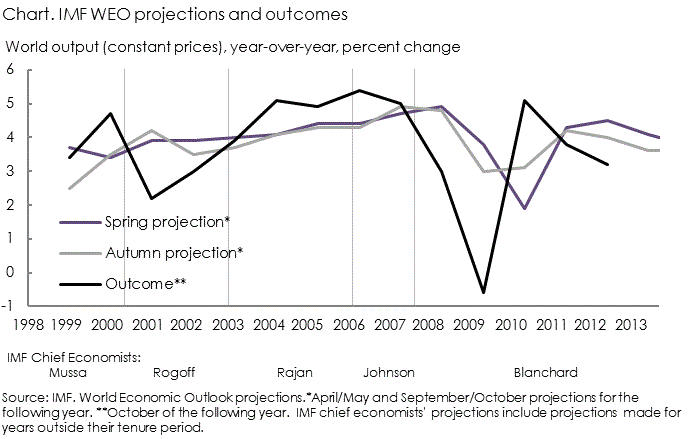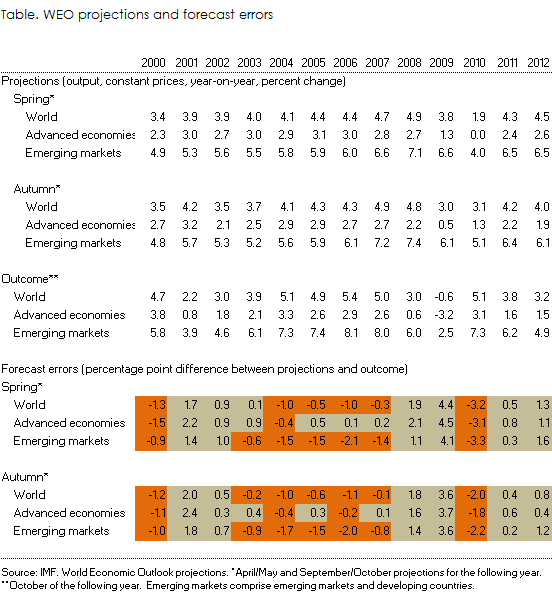IMF economic forecasts
14 October 2013
Ousmène Jacques Mandeng, Global Institutional Relations Group, Prudential Investment Management
The International Monetary Fund’s (IMF) economic forecast is a serious matter. It is the most authoritative of economic projections. The IMF also gives policy advice on the basis of those projections. No institution employs more resources and a greater number of highly qualified economists—a gross budget of US$1.1 billion and 2061 professional and managerial staff—to follow countries’ economic developments in detail.1 It seems therefore safe to assume that the IMF should know best. Yet, the IMF has recently been exceedingly optimistic or pessimistic in its economic projections and more importantly appears to exhibit important projection biases.2 As the IMF finds it difficult to get the projections right most forecasters are likely to fail too. The latest IMF forecast may therefore simply be a good reminder that the future and even the immediate future remain rather uncertain.
The IMF in its latest survey of the world economy published on 7 October, the World Economic Outlook (WEO) says that “global growth is still weak, its underlying dynamics are changing and the risks to the forecast remain to the downside. In a departure from previous developments since the Great Recession, the advanced economies have recently gained some speed, while the emerging market economies have slowed.” This represents a considerable deviation from its emphasis in April on a “three-speed” recovery. World growth for 2013 has been revised downwards for the fourth consecutive time—WEO survey are normally published in April (Spring) and October (Autumn) but sometimes with interim revisions—from 4.1 percent in April 2012 to 2.9 percent in October 2013; emerging markets growth was downgraded from 6.0 percent to 4.5 percent over the same period. Global growth for 2014 was also revised down to 3.6 percent in October from 4.0 percent in April.
The IMF has missed major turning points (Chart). The IMF and most others had not foreseen the 2001 and 2009 downturns. The 2010 recovery has similarly not been spotted. The persistent slowdown since 2010 has been underestimated. The IMF has also since at least 2000 systematically overpredicted growth in advanced economies in October (April) in 9 (10) years out of 12 years and underpredicted growth in emerging markets and their resilience to adverse shocks in 6 (6) out of 12 years with growth in emerging markets having been continuously underpredicted in 2003-2007 (Table).
Crisis and recoveries are naturally very difficult to predict. The projections biases though seem to suggest that actual growth factors are less well understood. In emerging markets, that seems consistent with the notion that data quality tend to be on average poorer and that non-economic and financial factors may play a bigger role. The positive bias of advanced economies’ growth may imply that the effects of macroeconomic policy measures, in particular monetary policy but also fiscal policy, have been overestimated. This seems broadly to hold across the tenures of the IMF’s different Chief Economists and underlines the universal nature of the forecasting errors.
Economic forecasts remain as is well known in large part based on the understanding and extrapolations of historic observations. Structural changes therefore tend to be under or overestimated and throw forecasts off the mark. The world economy has seen at least two important changes: The increasing weight of emerging markets in the world economy and the considerable proliferation of public policies in advanced economies. Consideration needs to be given to understand better the fundamental impact those changes are set to exert on the global economy.
The IMF’s and most others economic forecasts will likely remain rather unreliable affairs. The interactions of different economic variables within and across countries, externalities of certain policy actions, dominance of key economies and sectors, persistence of shocks and regulatory and structural changes complicate considerably the formulation of economic forecasts hinting that modern economies may actually be too complex to allow construction of relatively accurate forecasts. Yet economic projections are still needed. Some warning label for the WEO therefore seems in order: Economic forecasts—Past performance is no guide to future performance.


1 IMF Annual Report 2013. Staff numbers as of April 2013. Budget fiscal year 2013 outturn. Not all professional and managerial staff are economists.
2 IMF World Economic Outlook (WEO) projections are reviewed regularly. E.g. in Timmermann, A. (2006), “An evaluation of the World Economic Outlook forecasts,” IMF Working Paper WP/06/59, Washington D.C., WEO forecasts for real GDP growth are portrayed to display a tendency for systematic overprediction; for the 2001 downturn, WEO forecasts generally overpredicted growth in all regions. However, the 2011 Triennial Surveillance Review—Report of the External Advisory Group, IMF, 31 August 2011 does not refer to the WEO projections. Also see Batchelor, R. (2000), “The IMF and OECD versus Consensus Economics,” City University Business School, London.